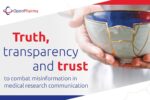This week, we listen to Amanda Solis and Leslie Rotz as they explain how to harness social media for medical research communication. We share a call for proposals for the 2026 NISO Plus conference and explore how OA publishing influences policy citations. We recognize global research funders’ endorsement of the WHO Joint statement on strengthening clinical trials, and we consider how restricted access to abstracts could degrade research discovery. Finally, we read about the extent of publishers’ soft power, investigate a wave of AI-assisted copycat articles and learn about a new partnership to detect image manipulation.
To listen to:
Harness social media for medical communication via ISMPP | 27-minute listen
In this latest episode of the International Society for Medical Publications Professionals (ISMPP) In plain cite podcast, Amanda Solis (Digital Medical Engagement Team Lead at Pfizer) and Leslie Rotz (Managing Director, Insights & Connections at Fingerpaint Medical) discuss how social media should be considered a core part of publication strategy and an important channel to share critical insights with healthcare professionals. For those new to social media, Amanda and Leslie break down how to get started and provide insight on how to balance reach, compliance, content planning and metrics.
To engage with:
NISO Plus Baltimore 2026: call for session proposals via NISO
The National Information Standards Organization (NISO) invites librarians, publishers, vendors and others to submit proposals for the 2026 Plus conference. Taking place in Baltimore, MA, USA from 16 to 18 February 2026, the conference invites stakeholders to collectively “identify [industry] challenges and opportunities, and to generate concrete ideas that will address them”. Proposals for 40-minute interactive sessions are welcomed until 17 October. More information can be found on the NISO Plus website.
To read:
Publish OA to influence policy via The Scholarly Kitchen | 5-minute read
Open access (OA) articles are more likely to be cited in policy documents according to new research by Nicola Jones (Director, SDG Programme at Springer Nature Group) and Katie Shamash (Head of Data at Overton). Prompted by Global Goals Week, Nicola and Katie investigated how academic research shapes policy related to the United Nations Sustainable Development Goals (SDGs). Using the Overton Index of policy citation data, they found that OA articles were cited in policy documents both more frequently and more quickly than paywalled content, with no significant difference in the citation rates between publications from inclusive and selective journals.
Global research funders unite to strengthen clinical trials via WHO | 6-minute read
Thirteen of the world’s largest non-commercial research funders have signed the World Health Organization (WHO) Joint statement on strengthening clinical trials. The move represents a collective commitment to implement the existing Guidance for best practices for clinical trials and the Global action plan for clinical trial ecosystem strengthening to enhance the design, conduct and reporting of clinical trials worldwide. In line with Open Pharma’s position statement, the aforementioned statement recognizes the importance of OA publishing and transparent data sharing. Sharing the news on LinkedIn, Chris Winchester (CEO of Oxford PharmaGenesis) encourages “ … more pharmaceutical companies to join them [the signatories]”.
Reduced access to abstracts threatens AI-powered research discovery via Aaron Tay’s Musings about Librarianship | 7-minute read
In his latest post, Aaron Tay (Head of Data Services at Singapore Management University Libraries) warns that the ‘fuel’ driving AI-powered research discovery – OA to article abstracts and meta data – is rapidly depleting. Tay highlights the recent move by Elsevier and Springer Nature to remove non-OA abstracts from the OpenAlex repository as both a warning and call to action. This article lays out the implications of changing access, including degraded artificial intelligence (AI) discovery for open indexing sources, and it suggests how libraries can respond to reduced abstract availability.
Publishers wield soft power: here’s how via LSE Impact Blog | 6-minute read
“By deciding how research is shared, who can access it, and how it connects to real-world challenges, [publishers] exert soft power through the values and choices embedded in how science is communicated”, argues Eleonora Colangelo (Public Affairs Officer at Frontiers). In this article, Eleonora outlines three dimensions of publishers’ influence – OA, investing in research integrity and facilitating multi-voiced communities through curation – and calls on publishers to acknowledge their power and use it responsibly.
AI fuels wave of ‘copycat’ publications via Nature | 6-minute read
Generative AI tools are fuelling an increase in redundant publications that don’t “include anything new [but] still pass plagiarism checks”, reports Matt Spick (Lecturer in Health and Biomedical Data Analytics at University of Surrey). In this article for Nature, Miryam Naddaf (Freelance Reporter), investigates the extent of AI-assisted ‘copycat’ articles and asks publishers how these articles have been able to avoid plagiarism detection software.
EditorialPilot integrates Imagetwin to automate integrity checks via STM Publishing News | 2-minute read
Integra – the company behind manuscript screening platform EditorialPilot – has announced a new partnership with Imagetwin. The integration will allow editors to screen for AI-generated figures, image manipulation and duplication, and plagiarism in a single AI-automated workflow. As Ashutosh Ghildiyal (Vice President of Growth and Strategy at Integra) explains, “image integrity has always been a critical checkpoint in scholarly publishing, but the rise of AI … has transformed it from important to indispensable”. The partnership “sets a new standard for integrity in publishing,” adds Patrick Starke (CEO of Imagetwin).


![[[A close-up view of a traditional printing press in operation, showing metal type and inked rollers in motion as printed material is prepared.]]](https://www.openpharma.blog/wp-content/uploads/2025/12/16Dec25-150x100.jpg)



